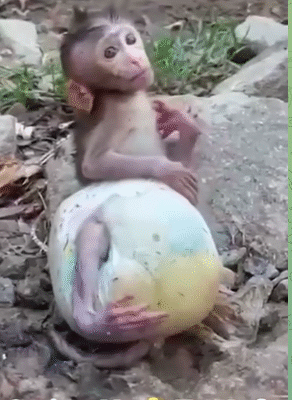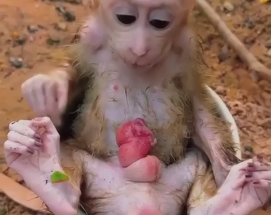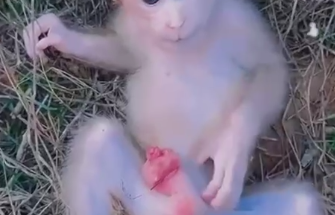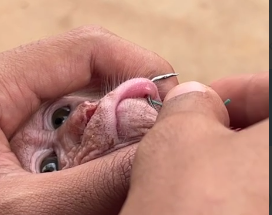In the heart of the lush rainforest, where towering trees whispered in the wind and sunlight filtered through dense green canopies, life was always unfolding in dramatic ways—both beautiful and heartbreaking. It was here, in a quiet clearing surrounded by ancient trees, that a profound story of love, loss, and hope took place.
A mother monkey, weak but determined, had labored through the night. She had been seen by researchers a few weeks prior, her belly swollen with life, and she had become a familiar presence in the area. Despite her frail condition, she fought to bring her baby into the world. Alone, she gave birth in the early hours of the morning as the jungle slowly came alive with the sounds of birds and insects. But her strength had reached its limit.
By the time a wildlife rescue team arrived, alerted by nearby villagers who had heard distressing cries from the forest, it was too late for the mother. She lay motionless on the forest floor, her body curled protectively around her newborn—an instinctive gesture that spoke volumes of her final moments. Her fur was matted, her breath long gone, but the tiny infant, still wet from birth, clung to her lifeless body, letting out weak, heartbreaking squeals for warmth, comfort, and survival.
The rescuers stood in silence for a few moments, taking in the painful scene. Even the jungle seemed to mourn. The tragedy of nature had played out again: a mother lost too soon, a baby left too early to fend for itself.
Gently, one of the team members approached. Wearing gloves and moving with utmost care, she peeled the newborn from his mother’s fur. The baby monkey, eyes still closed, barely the size of a human hand, clung instinctively to the rescuer’s finger. His tiny body trembled with the cold and trauma of birth and sudden loss.
They named him Kavi, a name meaning “poet” in the local language—a tribute to the silent poetry of his survival.
A Fragile Beginning
Kavi was rushed to the wildlife rescue center several miles away, wrapped in a soft cloth and held close to the chest of the rescuer to mimic the warmth and heartbeat of his mother. Every second mattered. Newborn monkeys, like human babies, are entirely dependent on their mothers not just for food but for emotional comfort, immune system development, and safety.
At the center, a small incubator had already been prepared. Kavi was cleaned, monitored, and given his first few drops of formula—a special milk designed to mimic the nutrients found in his mother’s. At first, he was too weak to suckle. But with careful syringing and gentle stroking, he slowly began to drink. Every drop was a victory.
Veterinarians and volunteers took turns watching over him day and night. He cried often—not in anger or pain, but in longing. He missed the warmth, the heartbeat, the scent of his mother. So the rescue team gave him a soft stuffed animal, shaped like a monkey, and placed a ticking clock inside it to mimic a heartbeat. Kavi curled into it immediately.
But caring for a newborn wild animal isn’t just about keeping it alive. It’s about preserving its instincts, ensuring it retains the skills it will need to one day return to the wild. That meant limited human contact, no excessive handling, and always respecting his space. It was a delicate balance—nurturing without taming.
Learning to Live
Over the next few weeks, Kavi grew stronger. His eyes opened, revealing large, curious orbs that seemed to take in everything at once. He began to grip with more strength, eventually learning to cling to the caregivers’ shirts the way he would to his mother’s fur. His cries grew louder—no longer desperate, but assertive. He was learning that he had a voice, and he was not afraid to use it.
By the second month, Kavi had outgrown the incubator and was moved to a soft hammock in a warm, quiet enclosure with a view of the treetops. There, he began to play. First with the stuffed toy, then with hanging ropes and branches installed to mimic the jungle environment. His body grew leaner, stronger. His movements, once sluggish and shaky, became quick and deliberate.
The rescue center had another young orphaned monkey, a female named Luma, who had been rescued months before Kavi. When both were strong enough, they were introduced under careful supervision. It was an instant connection. Kavi, still young and shy, followed Luma everywhere, copying her movements and learning from her. She, in turn, groomed him and let him sleep curled up against her chest.
This companionship became essential. For monkeys, especially social species like macaques or langurs, emotional bonds are vital. Kavi was finally getting a taste of what he had lost—the affection, play, and comfort of his own kind.
Toward Freedom
As the months passed, Kavi and Luma were moved to a larger semi-wild enclosure deep within the reserve. Here, human interaction was minimal. The goal was simple: prepare them for reintroduction to the wild.
They climbed real trees now, foraged for food, and interacted with other young monkeys in the rehabilitation group. They learned how to avoid snakes, how to recognize ripe fruit, and how to move silently through the canopy. Their caretakers watched from afar, smiling at each sign of independence.
One morning, nearly a year after he was found, the day arrived. The forest had been carefully surveyed, and a safe zone had been chosen. The gate to the forest enclosure was opened, and the group of young monkeys—Kavi and Luma among them—were given the chance to step into freedom.
At first, Kavi hesitated. The jungle was vast, mysterious, and full of unknowns. But Luma bounded ahead, calling back with a high-pitched chirp. Kavi followed. In a blur of movement, the two disappeared into the green, swinging gracefully from branch to branch.
The rescuers stood in silence, just as they had when they first found him. This time, however, their hearts were full—not of sorrow, but of quiet triumph.
A Story Worth Telling
Kavi’s story is one of sorrow, resilience, and ultimately hope. Though his beginning was marked by tragedy, it did not define his life. Thanks to the dedication of those who refused to let him be another forgotten victim of the wild, Kavi now lives as he was meant to—wild and free.



